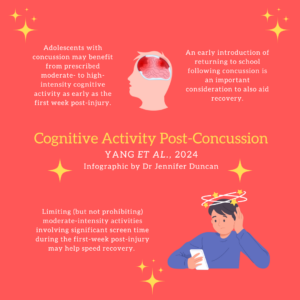Adolescents with Concussion Might Benefit from Moderate- to High-Intensity Cognitive Activity as Early as the First Week Post-Injury
Keywords: cognitive activity, concussion recovery, paediatric population
Concussion management in adolescents continues to be an important area of study, yet much of the research to date has focused on the effects of physical activity and its relationship to symptom duration and concussion recovery. In a study published in BJSM, researchers with the Center for Injury Research and Policy, Division of Sports Medicine, Center for Biobehavioral Health, and Division of Emergency Medicine at Nationwide Children’s Hospital examined the intensity and duration of cognitive activity post-concussion and its potential influence on concussion recovery outcomes (1). This blog will summarise the findings from this recent study.
Why is this study important?
There is minimal evidence on the intensity and duration of cognitive activity post-concussion, despite concussion potentially causing adverse effects on cognitive function, recovery and return to school (2) (3). This is likely due to the heterogeneity of concussive injuries and resulting effects on cognition as well as the challenges in measuring and monitoring cognitive activity. Thus, personalized cognitive activity guidelines are less frequently prescribed for adolescents with concussions.
How did the study go about this?
Researchers evaluated the intensity and duration of daily cognitive activity reported by adolescents (age 11-17 years) following concussion and examined the associations between these daily cognitive activities and post-concussion symptom duration. Participants reported increases in low-intensity cognitive activities and total minutes of overall cognitive activities as their symptoms resolved.
The relationship between level of cognitive activity and symptom resolution may be bidirectional, with improving post-concussion symptoms prompting higher levels of cognitive activity and vice versa. This study crucially controlled for current symptom levels when assessing associations between cognitive activity and symptom resolution.
What did the study find?
While both moderate- and high-intensity cognitive activities remained relatively low post-concussion, increased time spent in moderate- or high-intensity cognitive activities was associated with faster symptom resolution, especially for participants with lower post-acute symptom scores. Every additional 10 standardised minutes per hour spent on moderate- or high-intensity cognitive activities was associated with the recovery rate increasing by 22%
However, when these cognitive activities involved significant screen time e.g.like surfing the internet or playing video/computer games, during the first week post-injury, slower symptom resolution was observed independent of cognitive activity intensity.
The average time until returning to half- or full-day school was 4.5 days. Each day delay in returning to school post-concussion for either half or full days was associated with an 8% lower rate of symptom resolution.
What are the key take-home points?
This study has several important clinical implications. Adolescents with concussion, especially those with relatively less severe post-acute symptoms, may benefit from prescribed moderate- to high-intensity cognitive activity as early as the first week post-injury. Further, limiting (but not prohibiting) moderate-intensity activities involving significant screen time (e.g., surfing the internet or video/computer gaming) during the first-week post-injury may help speed recovery. Finally, an early introduction of returning to school following concussion is an important consideration that may hasten timelines for recovery.

References:
(1) Yang J, Alshaikh E, Asa N ReAct Clinical Study Group, et al Exploring the association between cognitive activity and symptom resolution following concussion in adolescents aged 11–17 years British Journal of Sports Medicine 2024;58:328-333.
(2) Gibson S, Nigrovic LE, O’Brien M, Meehan WP 3rd. The effect of recommending cognitive rest on recovery from sport-related concussion. Brain Inj 2013;27(7-8):839-42.
(3) Brown NJ, Mannix RC, O’Brien MJ, et al. Effect of cognitive activity level on duration of post-concussion symptoms. Pediatrics 2014;133(2):e299-304.
Authors of blog: Ginger Yang, Tracey Mehan